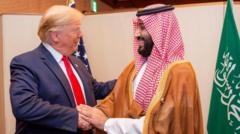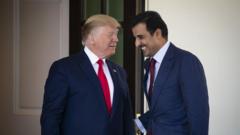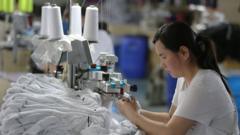In an effort to boost the US economy through Gulf investment, President Trump's upcoming diplomatic trip seeks to establish strategic partnerships and bolster economic ties between the US and Gulf states, especially amid recent economic challenges.
**Gulf Investments in the US: Trump’s Strategic Diplomatic Mission**

**Gulf Investments in the US: Trump’s Strategic Diplomatic Mission**
US President Donald Trump’s focus on securing Gulf investments during his upcoming visit is poised to impact both sides significantly.
US President Donald Trump is set to embark on a critical diplomatic mission to the Gulf region, with a primary objective of attracting substantial investments that could invigorate the US economy. Anticipated to meet with Saudi Crown Prince Mohammed bin Salman on May 13, Trump’s visit is also expected to encompass a summit with Gulf leaders on May 14, followed by stops in Qatar and the UAE.
Economist Karen Young emphasizes that Trump aims to publicly showcase new Gulf investments, while estimating their anticipated positive effects on American job creation and domestic manufacturing. This visit will further be significant given its timing – the first international trip of Trump's second term, which was briefly interrupted by his attendance at Pope Francis's funeral in Rome.
Investment discussions will feature prominently, as powerful figures from Wall Street and Silicon Valley are set to attend a Saudi-US investment forum that same day. Despite economic turbulence in the US, highlighted by the recent decline in economic output, there is an optimistic signal regarding the potential for new agreements with Gulf sovereign wealth funds.
Saudi Arabia has previously asserted plans to invest $600 billion in the US, but Trump has expressed a desire for that number to reach $1 trillion, including military equipment purchases. Saudi commentator Ali Shihabi foresees economic agreements that will deepen the ties between the two nations, involving new joint ventures and procurement of American goods.
The Saudi Public Investment Fund (PIF), which commands assets worth $925 billion, has previously made investments in various American companies, including Uber and Lucid Motors. Meanwhile, the UAE has committed to investing $1.4 trillion in the US tech sectors over the next ten years, emphasizing the significance of these relationships.
While expectations are high for immediate results from Trump's visit, some experts, including Young, suggest that many of these investments should be viewed as long-term strategic decisions rather than immediate financial influxes. Notably, potential arms deals exceeding $100 billion are anticipated to be disclosed during Trump’s visit, showcasing a return to military commerce following past restrictions under the Biden Administration.
Topics such as artificial intelligence will dominate discussions, bolstered by recent changes in US chip export regulations that promise greater tech access for Gulf states investing in AI. The UAE, in particular, has sought access to advanced US technology to position itself as a global AI leader.
Trump's urgent push for investment is mirrored by Saudi’s aspirations in diversifying its economic reliance on oil, highlighted by ambitious projects and efforts to stimulate foreign investments. However, it’s worth noting that recent declines in global oil prices add pressure on Riyadh's finances.
In summary, as the US-Saudi Business Council and private entities look towards bolstered economic collaborations, the focus remains on stronger ties amidst fluctuating geopolitical dynamics. Trump's expedition aims at producing impactful headlines of lucrative agreements that can be leveraged politically, indicating a reciprocal interest in investment partnerships that will benefit both sides moving forward.





















